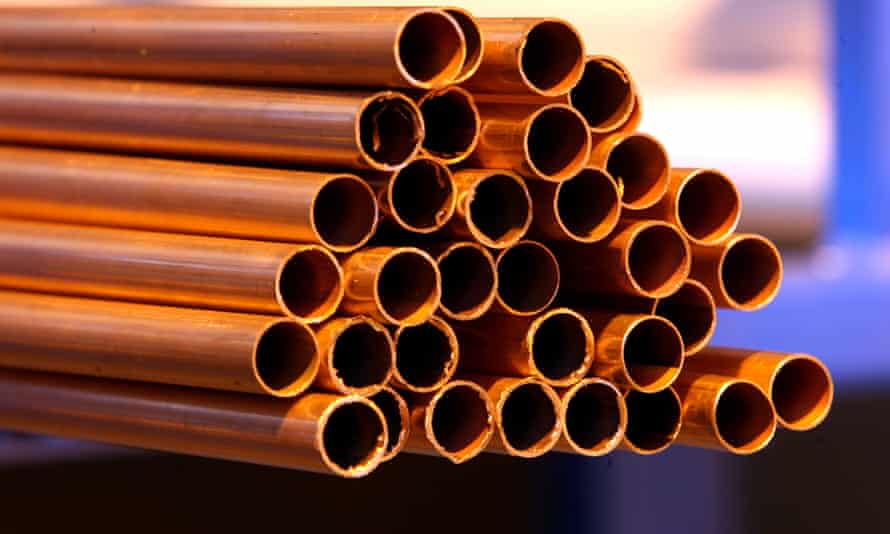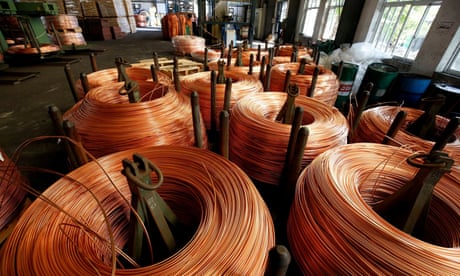Extract from The Guardian
Renewable energy will rely heavily on an industry already berated for human rights violations.

Copper is as key to the renewable energy industry as the sun and wind.
Last modified on Mon 28 Jun 2021 03.57 AEST
Interest in Dogger Bank was once restricted to insomniac enthusiasts for the BBC’s Shipping Forecast. Not any more. Today, the shallow sandbank, located 120 miles off the UK’s north-eastern shoreline, is home to the world’s largest windpower project. When fully operational, giant turbines will transmit 3.6 gigawatts (GW) of electricity, enough to power 5m homes, into the National Grid at prices well below current levels.
Welcome to the beginning of the end of the fossil fuel era. Around the world, solar and wind now represent the cheapest source of new electricity generation – and prices are tumbling. Electric vehicle (EV) batteries are driving oil towards obsolescence. Stripped of government subsidies and corporate lobbying carbon-based fuels are a busted flush. The future of energy is green – and the future can’t come soon enough to tackle the climate crisis.
In November governments will gather in Scotland for the Cop26 climate summit aimed at getting the world on track for achieving the 2015 Paris agreement goal of holding average temperature rises below 1.5C. That will take a fivefold increase in global renewable energy generation by 2030 en route to a zero-carbon world by mid-century.
Expanding renewable energy is a mineral intensive enterprise. Nature might provide the solar radiation and wind providing renewable energy, but the arteries through which the electricity flows are made of copper – and lots of it. Wind turbine gearboxes need manganese, platinum and rare earth magnets. EV batteries are made with lithium, cobalt and nickel. According to the International Energy Agency (IEA), a mid-century zero-carbon world will take a sixfold increase in the production of these and other transition minerals by 2030. Prices are already surging.
The supply chains through which transition minerals flow are highly concentrated. Small groups of countries – the Democratic Republic of the Congo (cobalt), Indonesia and the Philippines (nickel), Australia and Chile (lithium) – dominate production. But Chinese mining companies are rapidly increasing investments.
In processing, China is the main game in town. Its refining companies account for more than half of the world’s cobalt and lithium production. Global value chains for EV batteries are dominated from top to bottom by Chinese suppliers. They account for more than 80% of the raw materials for advanced battery materials.
That market structure explains why the prospect of a global mining boom is causing concern among human rights activists. “Make a list of the companies and countries producing transition minerals,” says Phil Bloomer, the director of the Business and Human Rights Resource Centre (BHRRC), “and you have a window on egregious and systematic violations of human rights”. The centre recently published a survey claiming more than 300 serious allegations against 115 transition mineral mining companies, ranging from the violation of indigenous land rights, to water pollution, health threats, corruption and a systemic failure to consult local communities.
Water-intensive lithium mining in the Atacama desert in Chile, the world’s driest environment, has triggered a wave of legal battles over water rights pitching indigenous communities against multinational mining companies. Nickel production in Indonesia and Australia is at the heart of battles over water pollution. Cobalt mining in the DRC has been linked to allegations of child labour, the financing of armed groups, and industrial-scale corruption linking multinational mining companies to politically connected intermediaries via a complex web of offshore shell companies.
Current approaches to resource governance have followed a familiar pattern. Listed western mining companies and users of transition minerals report to shareholders through a bewildering array of voluntary arrangements and corporate social responsibility initiatives covering specific metals, countries, and financial transparency. Environmental, social and corporate governance investors have focused overwhelmingly on the environment and carbon footprint of mining, in effect downplaying human rights.
None of which appears remotely fit for the purpose. The absence of Chinese companies leaves much of the supply chain hidden from view. Financial disclosure on links to offshore-listed companies is often limited. Meanwhile, human rights reporting standards are uneven, inconsistent and sometimes derisory.
Constructive engagement with China is critical to transition mineral governance. The Biden administration’s drift towards a geopolitical natural resource nationalism setting western countries against Beijing is as short-sighted as it is futile. There are many areas in which Chinese policies need reform, including the use of debt to secure access to minerals in Africa. But for the foreseeable future, many batteries fuelling EVs like the batteries in your mobile phone and PC, are likely to be built through supply chains linking cobalt mines in the DRC and lithium mines in Chile to factories in China.
Cop26 provides an opportunity for the EU, US and China to forge a new multilateralism. The starting point should be a shift towards mandatory human rights due diligence reporting. The EU has already announced an intent to move in this direction, potentially opening the door to sanctions against companies for breach of due diligence and legal redress for communities. The US Securities and Exchange Commission is similarly planning to make environmental and human rights disclosures mandatory.
That is an outcome none of us can afford. With the right governance we can ensure that the green revolution in energy does not become a new resource curse for the poor – without it, we all lose.
Kevin Watkins is chief executive of Save the Children UK

No comments:
Post a Comment